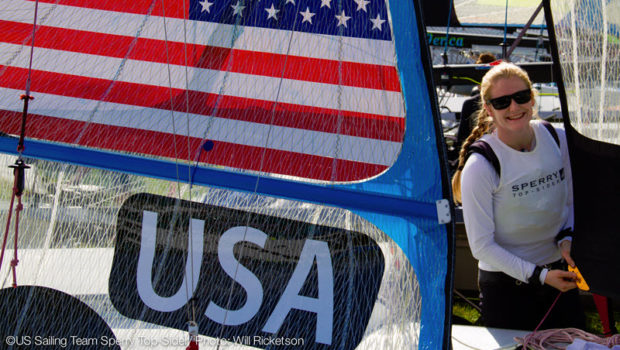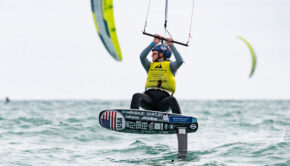Helena Scutt: Being Coachable
Published on August 3rd, 2016
Sixteen year old Kelsey Tostenson reached out to top female sailors she admired, asking them if they would contribute to a project she called Gale Force Girls. The mission of the project was ‘girl sailing’, to highlight the tremendous people who Kelsey saw as a positive influence for women in the sport. Here is the submission by Helena Scutt who will represent USA at the Rio Olympics in the Women’s 49er FX two person skiff…
As a member of the 2016 US Olympic Sailing Team, most people are surprised when I say that I learned to race only eight years ago. I turned 25 this summer, and I started to learn to race when I was 15 or 16. I totally missed the Opti phase because I was soccer-obsessed.
So partly I’m here to tell you that it’s totally fine if you don’t have as many sailing years as some of your sailing friends! Don’t be intimidated. What matters for your progress is not the past, but the attitude and energy you bring to each day on the water.
I attribute my accelerated path in sailing mostly to being coachable. While this helped me learn fast in sailing, the best part is that it can be applied to almost anything in life that you want to improve at. So, what does it mean to be coachable? I see two equally important parts that can influence each other: your actions and your mindset.
I’ll start with the actions, since they are more concrete. Imagine the difference in the impression you make on your coach between these two scenarios:
♦ In the first, you are 20 minutes late to the start of the clinic on Saturday morning because you forgot your trapeze harness, and then you launch 15 minutes later than the group because you had to fix some rigging problems. Everything during the debriefs made sense at the time but two weeks later you can’t remember what you worked on because you didn’t take notes.
♦ In the second scenario, you spent a few minutes after practice during the week to make sure your boat was ready for the weekend, and you put all your stuff in one place ready to grab and go on Saturday morning. During the clinic debrief, you jot some notes down and a month later when a guest coach comes with some fresh perspective, you can refer to your notes and ask them the questions you thought of right after the debrief.
Clearly the second situation is much less stressful and more productive than the first. Imagine how much happier your coach and your teammates would be, and how much more focused you could be on sailing. Being on time, being prepared, taking notes, and asking questions are all actions that you need zero sailing knowledge to do, but can have an immense impact on your ability to improve rapidly.
It sounds simple, but mastering these skills now will pay off a ton when you’re traveling across the country for college sailing regattas and balancing college classes, or traveling around the world for an Olympic campaign that involves owning 3 boats on 3 different continents!
Second, work on your coachable mindset. This means seeking feedback from your coaches and teammates, and putting your ego aside for a second to absorb their input. Try your best to not be defensive and deflect the feedback. Ninety-nine percent of the time, by giving constructive feedback they are genuinely trying to help you, not make you feel inferior or bad.
When I was newer to sailing I remember thinking that when I was one of the best in the world, no one would be able to tell me I was doing anything wrong in the boat or on the racecourse, because I would be doing it so well. That idea is laughable to me now, because I know that the best sailors in the world are constantly looking for ways to improve. They know they aren’t perfect, they are always striving to be better, and they seek feedback to achieve more.
Sometimes the vibe between you and your coach or teammate gets tense. Again, set aside your pride and make sure your desire to improve is stronger than your desire to be right. This is really hard, and it is something I am still working on. But I promise you, that when you listen, understand, and then implement the feedback, it will be worth it when you see better results!
My final suggestion for being a more coachable sailor is to express gratitude. It’s as easy as saying “thank you” to your coach at the end of practice, and to the race committee and volunteers at regattas. Make your skipper or crew feel appreciated. Being thankful always makes me feel happier, and when you’re happier, you’re more energetic and willing to learn.









 We’ll keep your information safe.
We’ll keep your information safe.